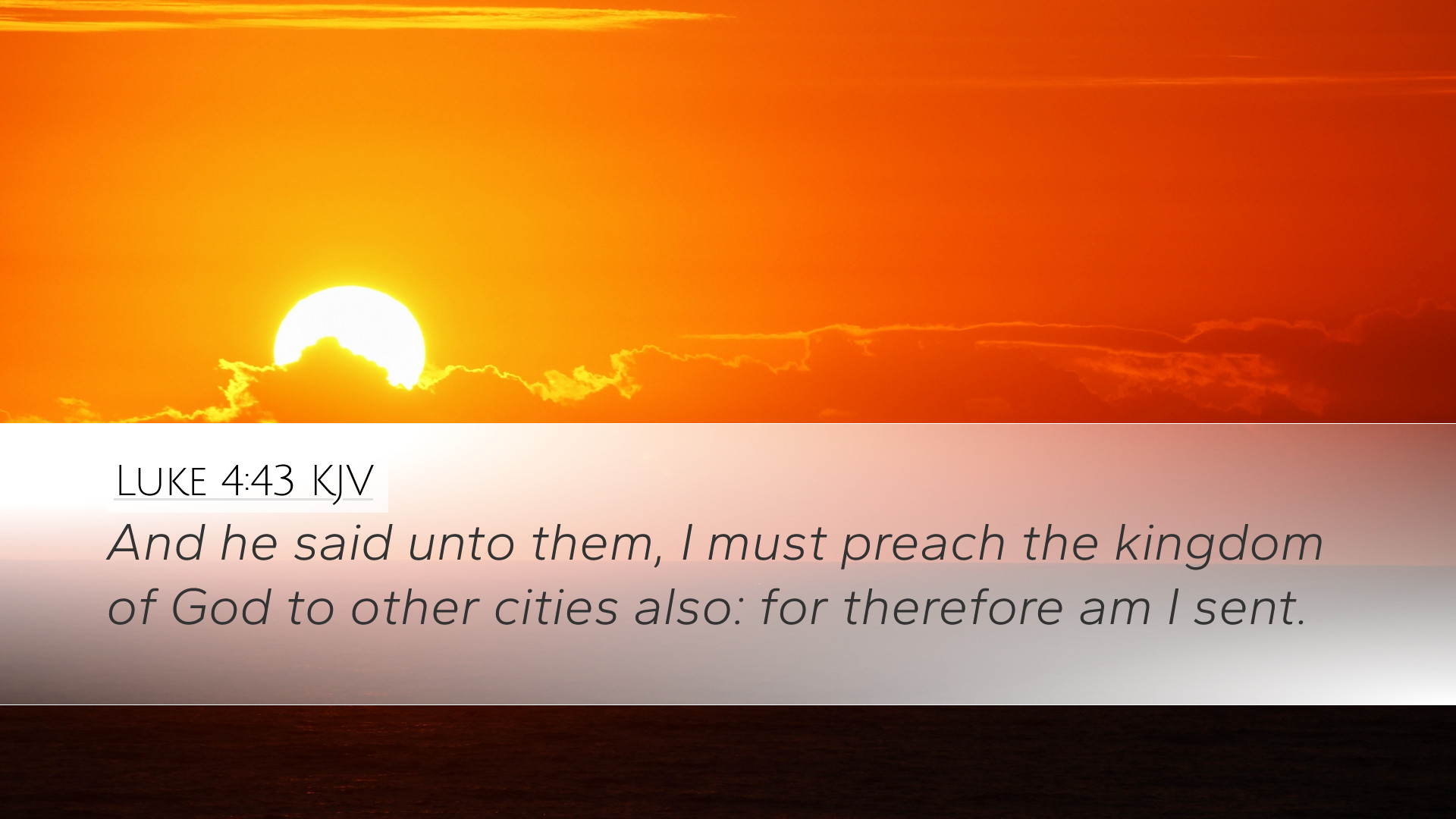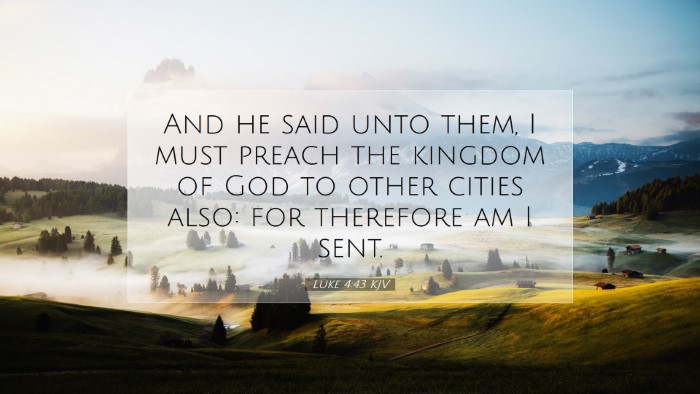Commentary on Luke 4:43
Luke 4:43 states: "But He said to them, ‘I must preach the kingdom of God to the other cities also, for I was sent for this purpose.’”
Introduction
This verse encapsulates the essence of Jesus’ mission on earth, highlighting His commitment to preaching the Kingdom of God. Various public domain commentaries, including those by Matthew Henry, Albert Barnes, and Adam Clarke, provide rich insights into the significance of this statement.
Contextual Analysis
The verse occurs in a pivotal moment in Jesus' ministry, after He has performed significant miracles in Capernaum. His fame has spread, and many seek Him for healing and miracles. However, in this statement, we see Jesus redirecting the focus from miraculous works to His primary mission: preaching.
Matthew Henry’s Insights
According to Matthew Henry, this verse demonstrates that Jesus acknowledges His divine mandate to proclaim the Kingdom of God. Henry asserts that Jesus is aware that His work involves not just the healing of individuals but the broader declaration of God’s reign. He emphasizes the following points:
- The Nature of Jesus’ Mission: Henry notes that Jesus’ mission is multifaceted, aimed at spiritual edification rather than mere physical healing.
- The Importance of Preaching: He points out that preaching is foundational to Jesus’ purpose and is what connects people to the Kingdom, as faith comes through hearing the Word.
- Diversity of Mission Fields: Henry suggests that Jesus recognized the necessity of reaching various regions, thus indicating a broader scope for His ministry.
Albert Barnes’ Commentary
Albert Barnes provides additional layers to understanding this verse, emphasizing the importance of Jesus’ declaration concerning the Kingdom of God. His commentary highlights:
- Jesus' Priority: Barnes emphasizes that preaching must take precedence over popular demand for miraculous happenings. Jesus acts in accordance with His purpose.
- The Kingdom of God: He explains that the Kingdom is not merely a physical domain but includes a realm where God reigns through His principles of righteousness, peace, and joy in the Holy Spirit.
- A Wide Reach: Barnes also discusses the geographical implications of Jesus’ ministry, pointing out His intent to extend the message of the Kingdom beyond Capernaum to other cities, highlighting the universal nature of the Gospel.
Adam Clarke’s Interpretation
Adam Clarke provides a theological and practical analysis of the implications of Jesus’ mission statement. He offers several insights:
- Theological Implications: Clarke elucidates that this declaration encapsulates Christ's role as the Messiah, who must fulfill His mission in its entirety.
- Purpose and Mission: He points out that Jesus’ choice to prioritize preaching reflects a model for ministry that emphasizes teaching and spiritual nurturing alongside miraculous signs.
- Evangelistic Urgency: Clarke observes a sense of urgency in Jesus' words, indicating the necessity of sharing the Good News with a broader audience without delay.
Broader Theological Significance
The verse serves not only as a statement of purpose but also as a reminder of the prioritization of preaching in Christian ministry. The collective observations from these commentators draw attention to several key theological insights:
- The Preeminence of God’s Word: The necessity of preaching the Kingdom underscores the centrality of the Word of God in shaping beliefs and practices.
- Missional Call: The directive to reach other cities speaks to the ongoing missional call of all believers to spread the Gospel beyond their immediate surroundings.
- Unity of Purpose: Jesus' commitment to His purpose is a theme that resonates throughout the Gospel and serves as a model for believers today regarding focus and dedication to God’s mission.
Conclusion
Luke 4:43 is a powerful reminder of Jesus’ focus on His mission to proclaim the Kingdom of God. The insights from Matthew Henry, Albert Barnes, and Adam Clarke provide a rich tapestry of understanding that informs the ministerial calling of pastors and the theological reflections of students and scholars alike. This passage challenges us to reflect on our own priorities as Christians and the urgency of sharing the Gospel in a world that desperately needs the Kingdom’s message.


